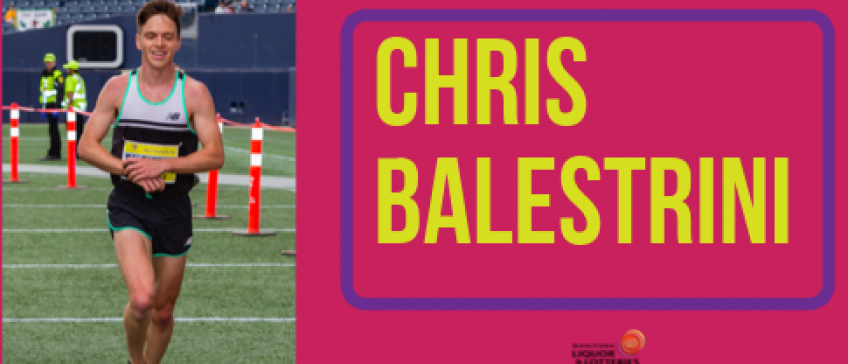Chris Balestrini is laser-focused on his performance as a premiere distance runner. On top of pursuing his MD in neurobiology, Chris is chasing his Olympic dreams training with the London Western Track Club. His aggressive training schedule is definitely producing results: he has hit PBs in the 5K, 10K, half and full and his season isn’t over yet. Read on to get some great insights into his training, mental keys to success and balancing everything else in between.
You started out your athletic career as a professional cyclist. Can you talk a bit about the decision to move your focus to cross-country and eventually into half marathons?
Throughout my early athletic pursuit I mixed in a combination of running and cycling. Cycling quickly became my focus, and I rode for the professional Louis Garneau-Quebecor team. I took a year off after high school to pursue cycling as a career, but when it looked like I was going to spend the following year racing in Europe, my parents strongly encouraged me to consider my academic future.
Cycling is a very different style of training than running. For cycling, if you can’t train upwards of 25 hours a week, it’s tough to compete. The strenuous nature of running – on bones, joints, and muscles – limits the amount of training that is possible (my highest week of running was 212km or about 130 miles which was still under 15 hours of training). Although my first few years transitioning back to running were less serious (my university team is known for indulging from time to time), it was easier to train for running while still staying on top of my studies.
It was my final year of USPORT eligibility that I began to run more seriously, I ended up being an All-Canadian in cross-country, finishing eleventh at the national championship. After that, I started focusing on longer distances, hoping my aerobic engine would carry over from cycling, and in the following year, I improved my half marathon time from 1:13 to 1:05.
You are running the half and the 10K for the majority of your races : can you talk about the differences in your preparation for the two distances? Does the process look different for those events or is there a lot of overlap?
I think there are two ways to think of a half marathon: 1) half of a marathon and 2) double of a 10K. Although some may roll their eyes, the subtle difference is what keeps me sane. My paces for the 10K and half marathon aren’t far from each other. My 10k best is 29:22 (set one week before the Canadian Half Championships this year), which is 2:56/km, but that’s on a track. Road 10ks would be more around 2:59/km, while my target pace for the half marathon is ~3:05-6/km.
I think of the half marathon as a slower 10k that you just hold a little longer. My coach (Dave Mills of London Western Track Club) has our group focus on shorter distances and speed in practice. For example, we might run a workout of 16x400m with 200m jog rest. This would be done somewhere between 3k and 5k race pace (about 65s/ lap) which is substantially faster than my 10k or half marathon pace. By training faster than race pace, it makes the race seem relaxing: as relaxing as sub 5-minute miles can feel!
You have finished top five in four of your last five half marathons, so clearly the half distance agrees with you. What do you think is the basis for your success at the half?
Thanks! Yeah, I love the half distance. I think it’s the perfect combination of speed and endurance (although I’m sure a lot of people would argue me on that point). For me, the 5k feels like a sprint, and the 10k feels like a suffer-fest. It’s the half that you learn to be smart early, but the last half of each race can feel completely different from that last, depending on the pack you’re with, the course, or how your body feels on the day.
The biggest key to success for me is consistency. I don’t see running hard and racing as something that wears me down, it’s what I’m most excited about at the end of the day. At the time of writing this, I’ve raced/paced 10 races (2 marathons, 3 half marathons, a 15k, 2 10ks, 2 5ks) in 2019. I’ve also averaged over 23km of running per day this year. Knock on wood, but I’ve been injury-free, and I think that has a lot to do with eating healthy, eating enough, and running easy on my easy days (sometimes up to two minutes per km slower than my half marathon pace).
At the Toronto Waterfront Half last year, you gave winner Will Norris quite the chase (Balestrini finished second just 16 seconds behind). Can you talk a bit about the head game of a ridiculously close race like that? What are you telling yourself in those last few miles?
It’s always disappointing when you don’t hit your goals; one of mine was to win that race! I knew Will fairly well at the time, through the racing scene, and knew the race would be close. We were together for 19km of the 21.1km race, which made it painstakingly tough to watch him pull away to victory. Unlike some races that only feel hard in the late stages, that race was a grind early on. We had a 5k stretch from 3-8k where we ran 14:59, that really put me in the hurt locker. From about 13km on I was thinking, “I really messed up here.” My personal best at the time was 1:09:47, so this was much faster than I’d ever run. The last 10 kilometers I was just holding on, of course, I was also thinking that maybe he was hurting as much as me (he wasn’t). He slowly put a gap on me but at that point my vision was blurred, I could feel my heart beating uncontrollably: to put it directly, I was in survival mode. That last kilometre was the longest stretch of pavement I’ve ever run. There hasn’t been a time, before or after, that I’ve dug that deep and come up with nothing.
A few months later I got my revenge on Will by outsprinting him to the finish line of the Houston Half Marathon, where we ran about 20 seconds faster (and I felt a million times better). But that’s the beauty of racing: some days you’re the hammer, some days you’re the nail.
What was the most personally challenging race you have ever run and why?
My first marathon was earlier this year in Rotterdam in the Netherlands. While Toronto would’ve been the most physically challenging race, the marathon challenged me in greater ways, particularly after I had crossed the line. I was going in feeling very confident that I would run under the World Championship Standard (2:16), so I went out a little quicker than that pace (1:07:16 through the halfway point). Due to naivety and inexperience, I relied on my bottles being set out on the course, and I didn’t take anything with me nutritionally. I missed my first 3 bottles, which meant I didn’t take in any fuel until the 20km mark of the route. In a half, you can get away with not taking in nutrition, in the marathon you cannot. By the 28km mark, I knew that it wasn’t going to be my day. I ran 2:22:10, which I was pretty disappointed with, but tried to take it with a grain of salt.
Immediately after the race, I signed up for the Ottawa Marathon (seven weeks later), wanting redemption and an opportunity to prove my fitness. My coach swiftly talked me out of the marathon, convincing me (correctly) that I would be throwing away the opportunity to have a summer season, and that a fall marathon would be the main goal of my year. I didn’t take a single day off after the marathon (big mistake) and raced a half marathon just four weeks later (I came in fifth at the BMO Vancouver Half in 1:07:22). Coming back and getting into a good mental state was the biggest challenge of my year, fortunately, I have great teammates and an amazing girlfriend (who also runs a smoking 16-flat 5k!) that dragged me out to train until I came out of my slump.
What goals have you set for yourself for the next year and what are you focusing on in your training to help get you there?
There is an obvious answer here, with the Olympics on the horizon. My take on things is a little different. I don’t want to build up the Olympics as the be all and end all, with my athletic career hinging on the outcome. My primary goal is to be a faster runner, able to compete on the international stage and represent Canada well. If I’m the absolute best that I can be, then I have no doubt that this will happen, and if I can get to the point where training is consistent, I think the results on the bigger stage will come. I do have some more specific goals: my goal for the fall is to be in the top-three Canadians at the Scotiabank Toronto Waterfront Marathon in October, which I think will take a time of 2:14 to accomplish. Past that, I want to do everything I can to run well at the IAAF World Half Marathon Championships in Poland. To get there, I’ll have to run well enough to be selected (selection criteria haven’t been released yet), which is a huge feat in and of itself.
As much as I want to be an 800m runner or 1500m runner, I think my aptitude is for long distance running. The first half of this year, I just wanted to race, and race a lot! In 2019 I’ve set personal bests in the 5k (road), 10k (road), 10k (track), half marathon, and marathon, so I’d like to think I’m on an upward trajectory! The first half of the year was focused on building strength and confidence by racing consistently, but what I’m really excited for is to see what I can accomplish when I’m solely focusing in on the marathon
What is your favorite post-workout recovery snack or meal?
I can’t resist a good burger and a hazy IPA post-workout/race. I did change it up after the Canadian Half Championships though; a group of friends and I went straight to The Common and enjoyed some pizza and a couple flights of beer before our flight home. I never limit myself when it comes to that stuff: everything in moderation is one of my keys to staying happy.
If you could travel back in time to the start of your running career, what would you tell yourself?
At first, I thought my answer would be something along the lines of “stick with it early, be consistent, and take it seriously,” but I don’t think I would have the same drive to train and race if my life was focused on running for that long. I’ll go a little more philosophical on this one: “Create an ideal image of yourself, and then surround yourself with people that drive you to get there.” It’s simple: as independent as I seem to my friends and family, I’ve really just been a sponge my whole life; soaking up wisdom, motivation, and a few other attributes from those I’ve been lucky enough to have in my life.

